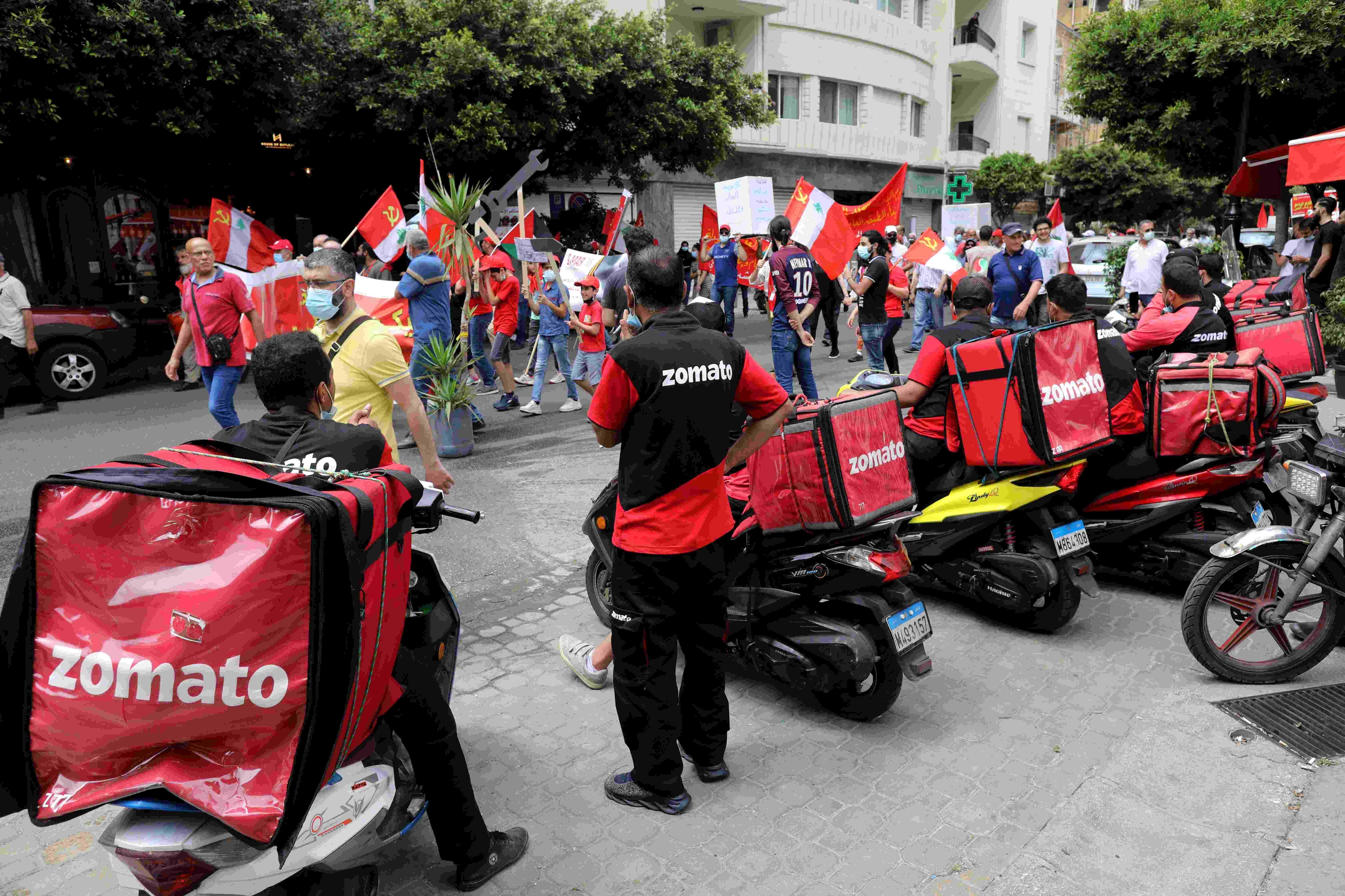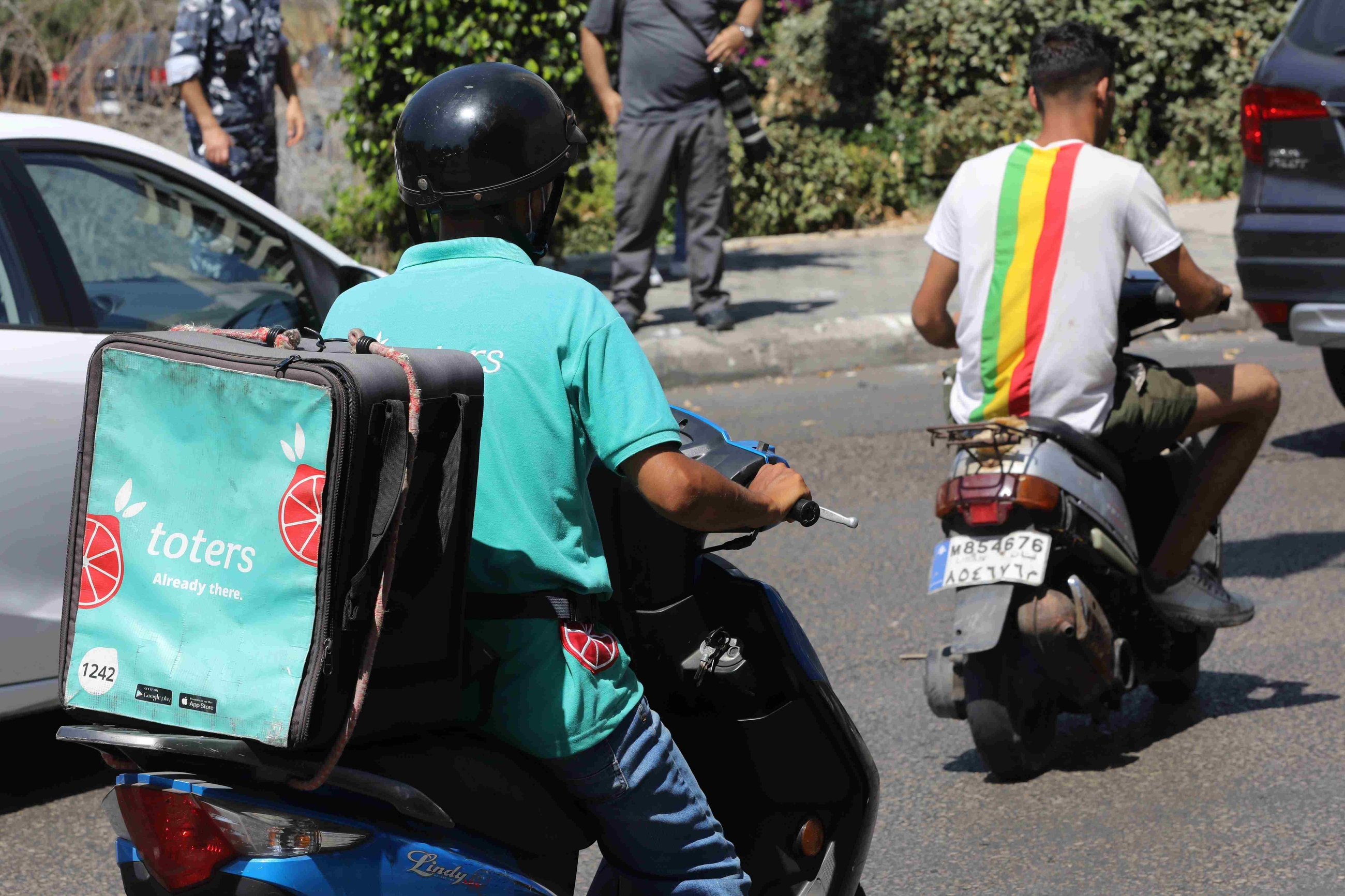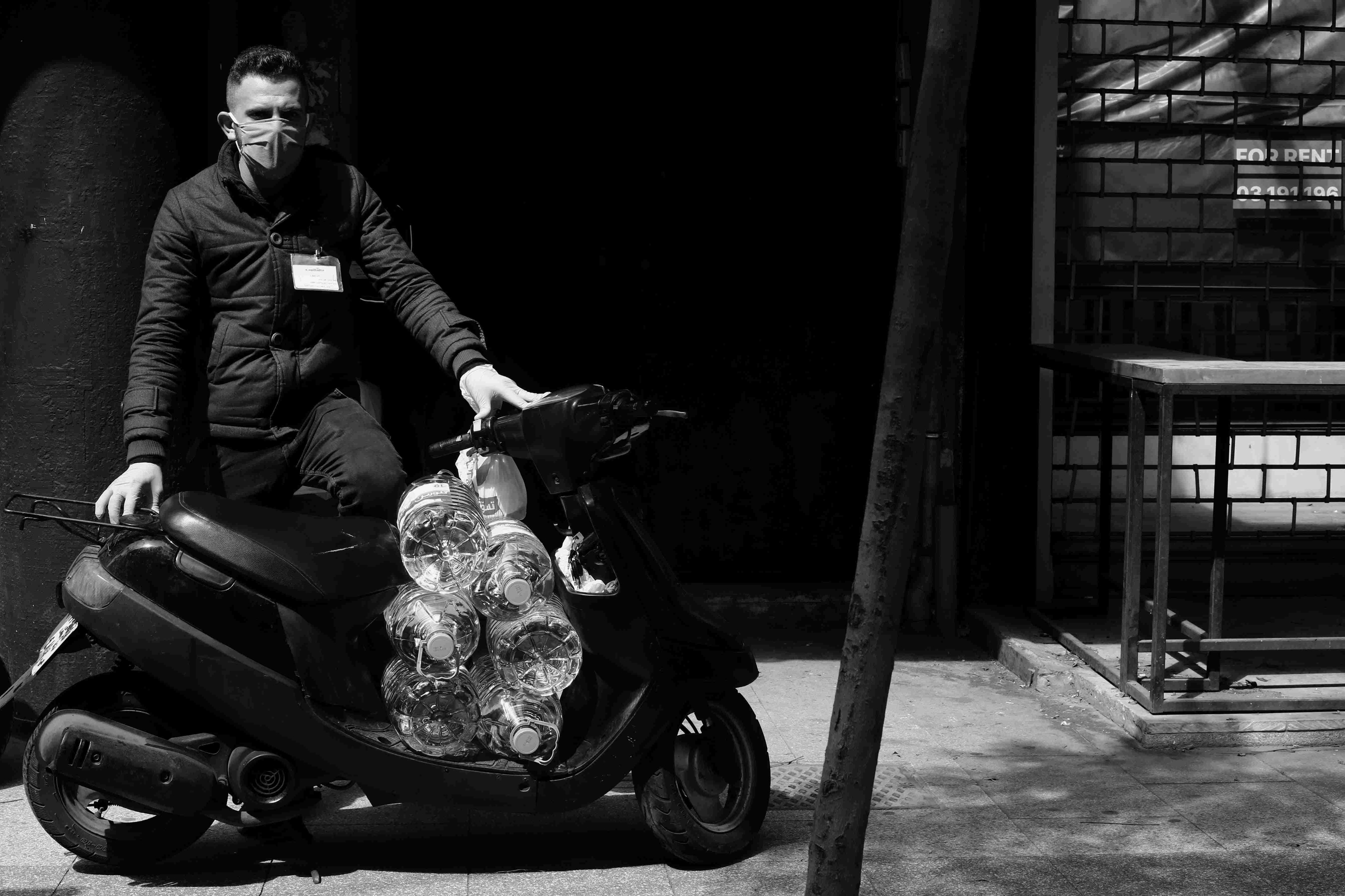Always on the Move, Yet Trapped in Precarity: On the Buried Dreams of Gig Economy Drivers
Editor's Note: Some drivers who spoke to The Public Source requested anonymity out of fear of repercussions on future job opportunities. Their names have been changed.
Every morning between July and December 2021, Houssam Sammoune, 36, woke up at 7:00 a.m. and clocked into a job he was genuinely grateful for, despite the long hours and the difficult conditions of his employment.
When a customer in Sed el-Bauchrieh, Dekwaneh, or Mkalles ordered food through the Zomato application, Houssam would get a notification on his phone. If both the restaurant and the customer were within a seven-kilometer radius, he hopped on his motorcycle to pick up the order and deliver it.
For the next 10 hours he would do this at least a dozen times, with little to no breaks in between.
“We didn’t really sit around a lot in between orders; you finish one and you’re already onto the next,” Houssam says. The bright-eyed youthful driver from Tripoli prides himself with love for work: “If I wasn’t abaday (hardworking and good at my job), I wouldn’t have regularly completed 27 orders in 10 hours.”
Like most drivers at Zomato, Houssam worked 10- to 11-hour shifts, six days a week, for an hourly rate of L.L. 10,000 and an additional L.L. 11,000 per delivery.
During the last two months of 2021, work began to slow down. Houssam had noticed an increasing decline in orders when Zomato announced on October 28, 2021 that it would cease delivery operations in Lebanon by mid-December 2021.
In November 2021, Zomato pulled out of international markets that were no longer profitable, including Lebanon, the US, the UK, and Singapore. Its delivery services only remain active in India.
Zomato has not responded to The Public Source’s requests for comment on drivers’ working conditions or on the details behind its closure in Lebanon. After three email exchanges, The Public Source was redirected to Zomato’s customer service portal, only to find the request deleted a day later.
Drivers for Zomato — who were not informed directly by the company about the reasons for the closure — suspect that increasing delivery fees with each fuel price hike had become unsustainable for the company, one of many multinationals to pull out of Lebanon in the midst of its economic crisis.
With Zomato closing, Houssam and many drivers have been left in limbo and on the hunt for new jobs. Whatever alternatives they have found pay less than their Zomato wage, which was already barely enough to sustain their families.
Lebanon’s currency has lost more than 90 percent of its value against the US dollar since 2019, plunging the country into one of the worst economic crises in the world in over a century. Residents of the country have lost both their buying power — since most wages have not been adjusted to match the economic decline — and their savings, as dollars held in Lebanese bank accounts are only accessible at a fraction of their original value. The legal minimum wage is still set at L.L. 675,000 per month — the equivalent of around $30 today.
More than 80 percent of the population now lives in poverty, according to the UN. In parallel, food prices have increased by 1,000 percent, according to the UN’s World Food Program in Lebanon, as the annual inflation rate reached a record peak of 224.39 percent in December 2021.
With Zomato closing, Houssam and many drivers have been left in limbo and on the hunt for new jobs. Whatever alternatives they have found pay less than their Zomato wage, which was already barely enough to sustain their families.
Like most drivers at Zomato, Houssam worked 10- to 11-hour shifts, six days a week, for an hourly rate of L.L. 10,000 and an additional L.L. 11,000 per delivery.
Cumulating odd jobs and working late into the night, these drivers have had to sacrifice their dreams and time with their children in order to provide for their families’ most basic needs — with little hope for relief on the horizon.
Struggling To Make Ends Meet
The delivery drivers who spoke with The Public Source described an exhausting daily reality shared with hundreds of other drivers operating in Lebanon, many of them Syrian, their status in the country making them all the more vulnerable to exploitative working conditions.
Fouad, 26, and his wife fled Syria because of the crisis five years ago and came to Lebanon, only to be faced with its harsh economic reality and discriminatory labor practices. He has had to look for work outside of his field of expertise and take up delivery driving at a time when the odds are against anyone in this profession.
“The entire country is in crisis. Those who are well off and have their own businesses and assets are being affected, so imagine how those whose work is based on deliveries are faring,” the soft-spoken driver says, his sense of defeat audible in his voice.
While drivers told The Public Source that they considered Zomato their best shot at a relatively decent wage in Lebanon, they still struggled to make ends meet.

Considered “contracted workers” by law, delivery drivers in Lebanon do not receive labor protections, enduring precarious work conditions, low pay, and long hours. Beirut, Lebanon. November 12, 2021. (Marwan Tahtah/The Public Source)
Houssam and Fouad used to make L.L. 1.5 million per week at most. They paid L.L. 100,000 per day for fuel and about L.L. 80,000 per week on oil changes, in addition to spending at least L.L. 50,000 per month on mobile data to be able to receive orders, open maps, and contact restaurants or customers — meaning over half of their meager income went towards work-related expenses.
Houssam’s humble income provided for his wife and baby, who live with him in a rented flat in Sed el-Bauchrieh, as well as his two older children, who live in Tripoli with his ex-wife. He was barely making enough to cover his L.L. 600,000 monthly rent, food, and the exorbitant bills for private generators that reach almost L.L. 1 million in the quasi-absence of state-provided electricity. Like many parents, he struggles to afford baby formula, which costs around L.L. 180,000 per week — if he is able to find any at all.
In order to keep his head above water, Houssam had to take on a second job. After his 10-hour shift with Zomato ended at 7:00 p.m., he would be off delivering orders for Crepaway until closing time at 11:00 p.m. Only then could he go home to his wife and baby, who stayed up late to spend some time with him, before going to sleep and starting all over again, six days a week.
“I’d love to have more time with them, but what can I do about it? I need to work,” he says. Before 2019, an eight-hour shift as a delivery driver was enough for him to sustain his family, go on trips to the beach or mountains, and eat out on weekends. “Now, a lunch outside costs almost my whole salary.”
Daily Injustices
As if financial precarity was not enough, delivery drivers have had to face daily hurdles that affect their wages and make their jobs even more difficult.
Sometimes, drivers say, restaurants will signal orders as being ready for pickup as soon as they are confirmed on the application, which leaves drivers waiting for up to half an hour while the food is prepared — time that could have been spent on another delivery, ultimately costing them money.
When fuel prices went up during the summer of 2021, drivers wasted even more time waiting in gas queues. If they were fortunate enough to reach the gas pump before the station closed, they had to dip into their own pockets to pay for fuel.
“It got to a point where the money we were making each day was going to fuel. So anyone who’d saved up a little bit of money would have to spend it to work,” Fouad recalls.
At the worst of the fuel crisis, Houssam had to resort to storing fuel at home. He would fill his tank, pour the fuel in gallon jugs that he would keep at home in the shade, and go back out to fill his tank again. Though unsafe, he says this measure was necessary for him to keep working. Despite his efforts, he still ran out of fuel and had to stay home, skipping work on several occasions.
According to the drivers, however, Zomato would pressure them to clock into work even though wages were not adjusted to compensate for the increased costs of fuel necessary to perform their job.
When fuel prices went up during the summer of 2021, drivers wasted even more time waiting in gas queues. If they were fortunate enough to reach the gas pump before the station closed, they had to dip into their own pockets to pay for fuel.
This led three of the drivers’ “team leaders” for Zomato subsidiary Scooter to confront the administration in September 2021.
“We went on strike that day — all of the delivery drivers under Scooter,” Fouad says. “We went up to Scooter’s headquarters and caused a commotion there until they met our demands and we got a raise. It was still a minuscule amount, but we accepted the compromise.”
Zomato’s decision, albeit made under pressure, was perceived by some drivers as “respectable,” but the hours spent waiting in gas station queues still meant drivers were losing part of their hourly wages.

A May Day march takes place in Geitawi as Zomato drivers watch from the sidelines. Workers are not protected by Lebanon’s labor law if they are to establish or join labor organizations. Beirut, Lebanon. May 2021. (Marwan Tahtah/The Public Source)
In addition to the difficulties they endured during the fuel crisis, drivers also suffered deductions to their paychecks when Zomato restructured the way it charges restaurants commission.
In the past, when picking up an order from a restaurant, Zomato’s delivery drivers would pay for the order themselves, and then would, in turn, receive the full amount for the order from the customer, reimbursing what they had paid the restaurant. Zomato’s commissions charged to partner restaurants would be settled afterward, separately.
In the last quarter of 2021, this changed. In order to quickly settle any pending dues before its closure, Zomato tasked its drivers with handling the commission by having them pay only a fraction of the order amount to restaurants at pickup. Drivers would still collect the full amount from customers, but would turn in the difference to Zomato at the end of their shifts.
Fouad tells The Public Source that this change led to extra daily deductions at the drivers’ expense. While drivers wouldn’t make an issue out of it in order to avoid conflict with their employer, these deductions, though relatively small — often L.L. 10,000 or 20,000, but sometimes as much as L.L. 100,000 — accumulated and contributed significant losses to their monthly pay.
“[At the end of] every day, we’d turn in our change and would sign receipts [to document this]. All of the receipts are available, signed and turned in, but their excuse is that I must have a few missing. They tried to avoid the situation and didn’t compensate me for them… So I lost around L.L. 1 million in my last paycheck,” Fouad estimates.
In 2020, Zomato ranked at the bottom of a labor standard index among Indian start-ups.
In addition to frequent losses from their low pay, drivers were not provided with basic amenities while on the job because they were not Zomato employees. Delivery drivers were hired through two contracted companies: VeSpeed and Scooter.
The two companies functioned the same way, except for one thing, which made a major difference to the daily lives of the drivers: Scooter drivers were provided with a place to rest between orders known to them as the “hub,” exclusive to Scooter drivers.
Scooter had rented out a wide, open space behind the Électricité du Liban headquarters in Gemmayzeh, including a couple of bathrooms, and a small room where drivers could keep their belongings and uniforms. The managers or “team leaders” would rest in another room furnished with chairs and a table, while the drivers would sit on their motorcycles or chairs in the open area outside.
Fouad, who worked for Zomato through Scooter, could use the hub to rest during whatever downtime he had. Houssam worked for VeSpeed and had to resort to unofficial meeting points for drivers in his area, such as Furn Beaino in Dekwaneh, or the home of whoever was lucky enough to live in the zone they covered at work. Otherwise, drivers would resort to vacant parking lots, street corners near restaurants, and mosques. Neither Zomato nor VeSpeed provided their drivers with a place to rest or wait between orders.
Seemingly small daily injustices are part of a larger trend of mistreatment that workers at Zomato and other delivery apps have reported across many countries where these companies operate. In 2020, Zomato ranked at the bottom of a labor standard index among Indian start-ups, according to a report by the Fairwork Project, an initiative monitoring digital platforms that offer freelance gigs to workers. Low pay, long hours, and fuel expenses have also been documented by drivers on Twitter and by Indian media organizations.
The Aftermath of Zomato’s Demise
Many former Zomato drivers are now scattered across different delivery jobs — often several at once — barely scraping together enough to get by.
In the wake of Zomato’s demise, a rumor began to circulate among drivers that Scooter would be launching a similar application and keep around 50 of its drivers employed.
This rumor struck fear in Fouad’s heart. He was not optimistic that he would be among the drivers to retain their jobs because he is not Lebanese. He has yet to hear from Scooter.
Meanwhile, the most VeSpeed has done since Zomato shut down is create a group chat to share job openings with drivers looking for work, according to Wael, who has been without work since the closure, aside from a few odd jobs.
“I don’t really have a salary anymore,” the young driver says. “There’s an office I know that imports goods and I work with them when they have orders — and if there’s a restaurant that needs a delivery person, they’ll call me when they have an extra order and ask me to take it. And hamdillah... I’m alive.”
Despite his best efforts, Wael has not been able to secure a fixed job as a delivery person with a specific restaurant.
“There’s a priority line, you know? There are people who were working with them before me.”
Nowadays Wael might earn L.L. 100,000 a day at most, and he says that even that is difficult to attain; some days he cannot find work at all.
Some drivers have been successful getting work with restaurants directly. Through friends he made at Furn Beaino from all his days spent waiting for Zomato orders there, Houssam was able to get a job with the busy bakery.
Being restricted to one restaurant, however, means Houssam now delivers fewer orders per day and has to make do with a lower salary. “I’m doing as well as I can given the circumstances. Katter kher Allah.”
Others were hired by other delivery applications or services — but the transition has been far from easy.
“Of the guys who were working with us at Zomato, I think it’s safe to say around 50 percent of them are now working with Toters,” Fouad tells The Public Source of the hiring wave he noticed by the local competitor food delivery app. He, too, now works for Toters.

A Toters delivery worker drives through traffic to complete an order. Beirut, Lebanon. August 12, 2021. (Marwan Tahtah/The Public Source)
Because of the increase in food prices, fewer orders are being placed, and because of the large number of delivery drivers now at Toters, there are fewer orders for each of them than there were at Zomato. In addition to the smaller workload, Toters only compensates drivers per delivery at a rate adjusted to the distance traveled, with no hourly compensation.
Despite the success of the Scooter strike for better wages in the summer of 2021, Fouad worries unionizing or organizing for better pay today has the potential to make their work situations worse.
“It could cause problems for us,” Fouad fears.
And his fears are not unfounded. Toters has repressed driver mobilizations for better conditions in the past.
A Thomson Reuters Foundation report revealed that in October 2021, when Fouad was still with Zomato, drivers at Toters confronted their managers to request improvements in pay and working conditions. The company threatened the drivers, telling them they could easily be replaced. According to the report, when some Toters drivers took to social media to collectively discuss striking in response, the administration froze their Toters accounts, preventing them from working and essentially coercing them into taking down their posts.
Delivery drivers are not protected under Lebanon’s labor law as they are considered contracted workers and not employees, which means they are not afforded healthcare coverage, social security, and may be arbitrarily dismissed without prior notice. Moreover, Lebanon’s restrictive labor market and legal shackles on labor organizing obstruct the rise of a strong labor movement able to protect vulnerable workers.
Despite the significantly lower pay, Fouad is grateful to have a job with Toters at all; it is currently his best option in terms of relative stability.
“It’s true that there’s little work to be done, but what can we do? We have to get by however we can,” he says.
In fact, he explains to The Public Source, he is one of few Toters drivers to work into the late evening. Fouad works later hours to increase his chances of getting more orders, but he says most of his colleagues clock out at around 8:00 p.m. When the afternoon rush hours pass and the roads empty up, many drivers fear getting mugged in the later hours of the night.
“It’s actually happened with a few of us. About three or four of us have gotten mugged; they stole their money, their motorcycles,” he says. “One of us was even shot…”
Fouad has fortunately not experienced this so far. “And inshallah it won’t happen,” he chuckles nervously.
Delivery drivers are not protected under Lebanon’s labor law as they are considered contracted workers and not employees, which means they are not afforded healthcare coverage, social security, and may be arbitrarily dismissed without prior notice.
But he explains that, should anything happen to him, delivery companies like Zomato, Scooter, or Toters would do little to provide financial support in the aftermath.
“When we were with Zomato, one of our guys was pushed off his motorbike. They took the motorcycle and left him on the ground, unconscious. Someone woke him up and took him to the hospital. Insurance probably covered him, but for the company to reimburse him? No way,” he explains, frustrated. “He is not getting that motorcycle back.”
This is the main reason most drivers do not work late, he says; if their motorbikes or the money they carry are stolen, they are not reimbursed. “Everything we lose is a loss out of our own pockets.”

Delivery drivers have had to forego lifelong dreams in order to make ends meet in Lebanon’s harsh economy. Beirut, Lebanon. April 2020. (Marwan Tahtah/The Public Source)
Faced with these legitimate safety and material concerns, Fouad says he nonetheless has no choice but to work late into the night in order to support his relatives in Syria and provide for his family in Lebanon — he has two children, aged 3 and 5, to come home to.
“What can I do?” he says. “I’m working to make a better life for my children and my family, and for myself too.”
With five children and a partner, Wael also lives in constant worry of not being able to provide everyday necessities.
Because his financial priority is making sure his family gets by, he regretfully tells The Public Source that he cannot afford to enroll his children in school. And because of their status as Syrian refugees, he explains, “there are no [Lebanese] schools that will welcome them. They tell us we need documentation from the UN.”
By the time Wael was able to set up an interview with the UN to obtain the necessary documents, the school year had already begun and it was too late for his children to enroll.
Having moved to Lebanon to escape the war in Syria, Wael feels trapped and helpless.
“What can I do? There’s nowhere we can go except here.”
For many drivers, particularly those who are Syrian, Zomato’s closure is only the latest obstacle in a long line of events that have derailed their lives over the years.
Having had to drop out of school at a young age to flee the Syrian crisis, being on the move is not foreign to Mahrous.
In leaving his home behind in early 2019, Mahrous also left behind dreams of becoming a TV actor.
“I love acting a lot. If my circumstances and finances were better, I’d enroll in an art school to get a degree and practice,” he says wishfully.
When he first arrived in Lebanon, Mahrous picked up secondary roles in a handful of local TV shows, but the money he made was not enough. So, he took on a tailoring job before joining Zomato’s delivery team to survive and feed himself, his wife, and his two-year-old daughter. He worked for Toters after Zomato’s closure, but less than a month into the new job, he decided to leave Lebanon for the UAE — on the move again with no concrete plans, only the hope of better opportunities.
Having to move around is not foreign to Fouad and his wife either, who are both nurses. The couple met in a hospital in Aleppo, where they got married and worked together for a few years.
“Delivery is not my main job. Of course, each one of us would like to be doing work that makes us comfortable and allows us to make more [money] than a miserable job like this.”
Since their arrival in Lebanon five years ago, Fouad and his wife have looked for nursing work but have hit dead ends. Facing rejections and discrimination because they are Syrian, they haven’t been able to practice the profession they were trained to do — even as Lebanon’s healthcare system has collapsed and faces a mass exodus of healthcare workers.
Fouad dreams of sharing a workplace with his wife and practicing nursing — his calling — again.
“Delivery is not my main job. Of course, each one of us would like to be doing work that makes us comfortable and allows us to make more [money] than a miserable job like this,” he says.
Fouad’s biggest aspiration today is leaving Lebanon altogether due to the hardships he has faced here.
“In this country … You have to cast aside any dream you have because dreams cannot be achieved here,” he says, his eyes heavy.
“That’s why we’ve buried all our dreams behind us.”
